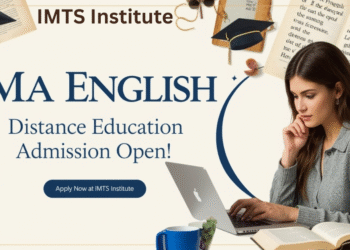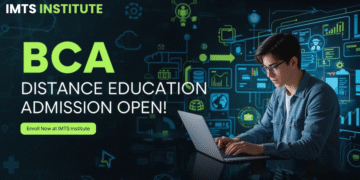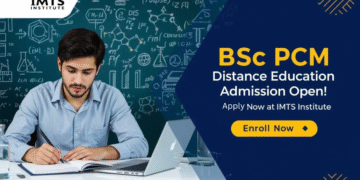LLB Distance Education Admission 2025 is Not Valid in India – Apply for Regular Mode Only
As per the latest Bar Council of India (BCI) and UGC-DEB guidelines, LLB Distance Education is not permitted in India for legal practice. If you’re planning to become a lawyer or work in legal services, you must take admission in a regular LLB program from a BCI-approved university. Distance or online LLB degrees are not recognized for enrollment as an advocate. Students must complete graduation with at least 50% marks (45% for SC/ST/OBC) to apply. Admission for the 3-year regular LLB course is open, and the last date to apply is 26 July 2025. Entrance exams like CLAT, LSAT, or university-specific tests are required. IMTS Institute provides free legal education counseling but does not offer distance LLB. Regular law programs include Criminal Law, Constitutional Law, Contract Law, and practical training like moot courts and internships. Fees range from ₹15,000 to ₹3,00,000 per year based on the university. After completing valid legal education, students can work as advocates, legal advisors, or appear for judicial services, earning ₹4 to ₹20 LPA.
LLB Distance Education Admission Process 2025-26
- Regulatory Status: Distance education for LLB is not approved by UGC-DEB and Bar Council of India, making such programs invalid for legal practice in courts.
- Alternative Pathways: Students must pursue regular mode LLB programs from BCI-approved universities to become practicing advocates and appear in court proceedings.
- IMTS Guidance: IMTS Institute offers free career counseling to help students understand valid legal education options and admission requirements for regular programs.
- Application Requirements: Regular LLB programs require graduation with minimum 50% marks, entrance exam scores, and completion of application forms before specified deadlines.
- Age Criteria: Most BCI-approved institutions accept candidates up to 30 years for three-year LLB programs with relaxation for reserved categories.
- Entrance Examinations: Students must appear for CLAT, LSAT, or university-specific entrance tests for admission to valid legal education programs.
LLB Distance Education Admission Overview
- About Course: LLB focuses on legal studies including Constitutional Law and Criminal Procedure, but only regular mode programs provide valid certification for legal practice.
- IMTS Benefits: IMTS Institute provides comprehensive guidance for choosing appropriate legal education pathways and understanding regulatory requirements for valid law degrees.
- Program Duration: Regular LLB programs span three years with full-time attendance requirements, practical training, and moot court participation for comprehensive legal education.
- Eligibility Criteria: Candidates need graduation from recognized universities with minimum 50% marks and must clear entrance examinations for admission consideration.
- Curriculum Overview: Legal education covers Constitutional Law, Criminal Law, Civil Procedure Code, Contract Law, Tort Law, and practical legal training components.
- Learning Requirements: Regular mode ensures classroom interaction, practical training, moot courts, and internships essential for developing legal advocacy skills.
- Career Opportunities: Valid legal education leads to advocate enrollment, judicial services, corporate law positions, and legal consultancy with substantial earning potential.
- Suggested Universities: Consider National Law Universities, Symbiosis Law School, Jindal Global Law School, and government law colleges for quality legal education.
What is LLB Distance Education?
LLB Distance Education refers to correspondence-based legal education programs that are not recognized in India. The Bar Council of India mandates that legal education must occur through regular classroom attendance with practical training components. Distance learning cannot provide essential elements like moot court participation, legal clinic experience, and interactive classroom discussions necessary for legal education.
Regular LLB programs include Constitutional Law, Criminal Law, Civil Procedure Code, and Legal Research Methodology. Students engage in case study analysis, legal drafting, and courtroom simulations. The curriculum emphasizes practical application through internships and moot court competitions. Legal education requires direct faculty interaction for developing advocacy skills and understanding complex legal principles.
Regulatory Framework: Only BCI-approved institutions can offer valid legal education. Students must complete full-time programs with mandatory attendance, practical training, and comprehensive assessment. Distance education lacks these essential components, making graduates ineligible for advocate enrollment and court practice in India.
Why Choose Regular LLB Education?
- Legal Practice Authority: Regular LLB graduates can enroll as advocates with Bar Council and practice law in Indian courts with full legal recognition.
- Comprehensive Training: Full-time programs provide moot court experience, legal clinic participation, internships, and direct faculty mentorship for practical skill development.
- Career Validation: BCI-approved degrees ensure eligibility for judicial services, prosecutor positions, corporate legal roles, and independent legal practice opportunities.
- Academic Rigor: Regular programs maintain strict attendance requirements, continuous assessment, practical training, and comprehensive evaluation ensuring quality legal education standards.
- Professional Networks: Classroom learning facilitates peer interaction, faculty connections, and professional networking essential for successful legal careers and practice development.
LLB Regular Education Admission Eligibility Criteria
- Educational Qualification: Candidates must possess graduation degree in any discipline from UGC-recognized university with minimum 50% aggregate marks requirement.
- Entrance Examination: Students must appear for CLAT, LSAT, or university-specific entrance tests and secure qualifying scores for admission consideration.
- Age Limitations: Most institutions accept candidates up to 30 years for three-year LLB programs with additional relaxation for SC/ST and OBC categories.
- Academic Performance: Strong academic record throughout graduation with consistent performance preferred, though specific subject requirements may vary across institutions.
- Language Proficiency: Excellent English communication skills essential for legal studies, case analysis, legal drafting, and courtroom advocacy practice.
- Medical Fitness: Some institutions require medical fitness certificates ensuring candidates can handle rigorous academic schedules and practical training requirements.
- Character Verification: Background verification and character certificates required as legal profession demands high ethical standards and professional integrity.
LLB Regular Education Fee Structure
- Government Institutions: Annual fees range from INR 10,000 to INR 50,000 for three-year programs in government law colleges and universities.
- Private Universities: Course fees vary from INR 1,00,000 to INR 5,00,000 annually depending on institution reputation, infrastructure, and faculty quality.
- National Law Universities: Premium institutions charge approximately INR 2,00,000 to INR 4,00,000 annually with additional accommodation and living expenses.
- Entrance Exam Fees: CLAT registration costs INR 4,000 for general category and INR 3,500 for reserved categories with additional processing charges.
- Additional Expenses: Students should budget for books, study materials, practical training fees, and examination costs totaling INR 20,000 to INR 40,000 annually.
- Scholarship Opportunities: Merit-based and need-based scholarships available for deserving candidates reducing financial burden significantly.
Benefits of Choosing Regular LLB Education
- Professional Recognition: BCI-approved degrees provide legal authority to practice law, represent clients in courts, and pursue judicial career opportunities.
- Practical Training: Comprehensive moot court experience, legal clinic participation, internships with law firms, and courtroom observation essential for advocacy skills.
- Faculty Interaction: Direct access to experienced legal professionals, judges, and practitioners providing mentorship and career guidance throughout academic journey.
- Peer Learning: Classroom discussions, group projects, and collaborative learning enhance understanding of complex legal concepts and case law analysis.
- Career Advancement: Valid legal education opens doors to diverse career paths including corporate law, litigation, judicial services, and academic positions.
List of Popular Universities for Regular LLB Admission
| Name of University | Eligibility | Approx Fees |
|---|---|---|
| National Law School Bangalore | CLAT Qualified + Graduation 50% | INR 2,50,000/year |
| Symbiosis Law School | SET Qualified + Graduation 45% | INR 3,00,000/year |
| Jindal Global Law School | LSAT/University Test + Graduation 50% | INR 4,50,000/year |
| Delhi University Faculty of Law | DU LLB Entrance + Graduation 50% | INR 15,000/year |
| Jamia Millia Islamia | Entrance Test + Graduation 50% | INR 25,000/year |
Regular LLB Admission: How to Apply?
- Research Universities: Visit official websites of BCI-approved institutions to understand admission criteria, entrance requirements, and application procedures for informed decisions.
- Entrance Preparation: Register for CLAT, LSAT, or university-specific entrance examinations and prepare thoroughly using recommended study materials and coaching guidance.
- Application Submission: Complete online application forms with accurate personal details, academic records, and upload required documents before specified deadlines.
- Document Verification: Submit original certificates, mark sheets, identity proofs, and category certificates for verification during counseling or admission process.
- Counseling Participation: Attend mandatory counseling sessions for seat allocation based on entrance exam ranks and preferred university choices.
- Fee Payment: Complete admission formalities by paying required fees through online payment systems or demand drafts as specified by institutions.
- Academic Commencement: Report to assigned institutions on specified dates with all required documents and begin academic sessions as per university calendars.
Documents Required for Regular LLB Admission
- Academic Certificates: Original graduation degree certificate and all semester mark sheets from qualifying examination for verification and admission processing.
- Entrance Scorecard: Valid entrance examination scorecard (CLAT/LSAT/University specific) showing qualifying marks for admission eligibility verification.
- Identity Documentation: Government-issued photo identity proof such as Aadhaar Card, Passport, or Driving License for official verification purposes.
- Category Certificates: SC/ST/OBC/EWS certificates issued by competent authorities for availing reservation benefits and fee concessions.
- Character Certificate: Issued by educational institution or competent authority verifying good moral character essential for legal profession entry.
- Medical Certificate: Fitness certificate from registered medical practitioner ensuring physical and mental capability for rigorous legal education requirements.
Career Prospects After Regular LLB Education
- Legal Practice: Enroll as advocate with Bar Council and practice law independently or join law firms with earning potential of INR 5-15 LPA.
- Judicial Services: Appear for competitive examinations for judicial officer positions with government salaries ranging INR 8-20 LPA plus benefits.
- Corporate Legal Advisor: Work with companies, banks, and corporations handling legal compliance and advisory roles earning INR 6-18 LPA.
- Public Prosecutor: Represent state in criminal cases with government appointment and fixed salary structure plus additional case allowances.
- Legal Academia: Teaching positions in law colleges and universities after completing LLM and qualifying NET examination with INR 4-12 LPA.
- Government Legal Officer: Legal advisor positions in various government departments and public sector undertakings with competitive salary packages.
Regular LLB Education Structure and Curriculum
Year 1
| Subject Code | Subject Name | Credits |
|---|---|---|
| LAW101 | Jurisprudence and Legal Theory | 4 |
| LAW102 | Constitutional Law I | 4 |
| LAW103 | Law of Torts and Consumer Protection | 4 |
| LAW104 | Criminal Law I | 4 |
| LAW105 | Law of Contract I | 4 |
Year 2
| Subject Code | Subject Name | Credits |
|---|---|---|
| LAW201 | Constitutional Law II | 4 |
| LAW202 | Criminal Procedure Code | 4 |
| LAW203 | Law of Contract II | 4 |
| LAW204 | Property Law | 4 |
| LAW205 | Family Law | 4 |
Year 3
| Subject Code | Subject Name | Credits |
|---|---|---|
| LAW301 | Civil Procedure Code | 4 |
| LAW302 | Company Law | 4 |
| LAW303 | Labour and Industrial Law | 4 |
| LAW304 | Environmental Law | 4 |
| LAW305 | Professional Ethics and Bar Bench Relations | 4 |
Conclusion
LLB Distance Education Admission 2025 is not available in India due to regulatory restrictions by UGC-DEB and Bar Council of India. Students seeking legal careers must pursue regular mode programs from BCI-approved institutions. Valid legal education requires classroom attendance, practical training, and comprehensive assessment ensuring professional competency. Regular LLB programs offer career opportunities in advocacy, judicial services, and corporate law with substantial earning potential ranging from INR 5-20 LPA.
Students should focus on entrance examination preparation and selecting appropriate institutions for quality legal education. The three-year regular program provides essential skills, practical training, and professional recognition necessary for successful legal careers. Admission processes typically conclude by August 2025 with academic sessions commencing thereafter. Prospective candidates must understand that only BCI-approved regular programs lead to valid legal practice authorization in Indian courts.
FAQ
Question: Can students practice law after completing LLB through distance education?
Answer: No, distance LLB is not recognized by Bar Council of India for legal practice. Only regular mode programs from BCI-approved institutions allow court practice and advocate enrollment.
Question: What are the main entrance examinations for regular LLB admission?
Answer: Students must appear for CLAT, LSAT, or university-specific entrance tests to secure admission in BCI-approved law colleges and universities across India.
Question: Are there age restrictions for three-year LLB program admission?
Answer: Most institutions accept candidates up to 30 years for regular LLB programs with additional age relaxation available for SC/ST and OBC categories.
Question: What is the typical fee structure for regular LLB programs?
Answer: Government colleges charge INR 10,000-50,000 annually while private institutions range from INR 1,00,000-5,00,000 depending on infrastructure and faculty quality.
Question: What career opportunities exist after completing regular LLB education?
Answer: Graduates can pursue advocacy, judicial services, corporate law positions, and government legal officer roles with earning potential of INR 5-20 LPA.
Question: How long does the regular LLB program take to complete?
Answer: The three-year regular LLB program requires full-time attendance with practical training, moot courts, and internships essential for comprehensive legal education and professional competency.



















